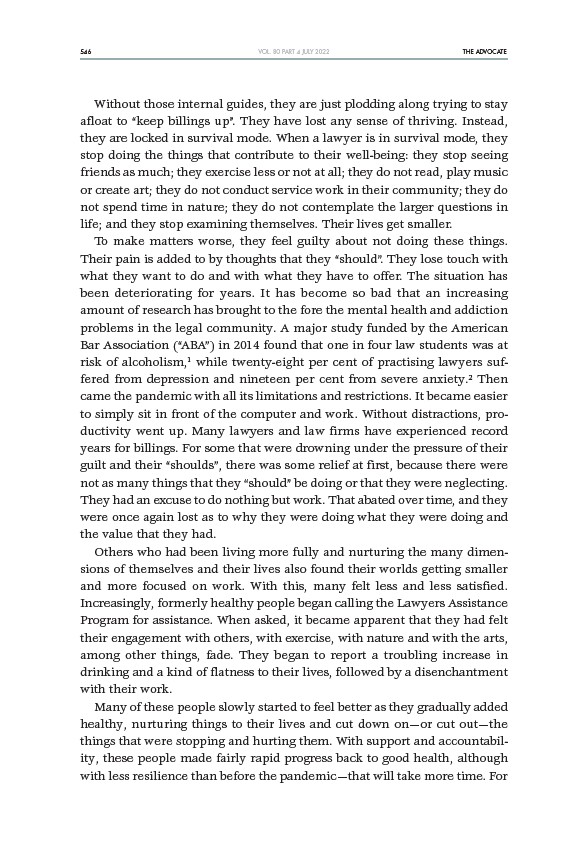
546 THE ADVOCATE
VOL. 80 PART 4 JULY 2022
Without those internal guides, they are just plodding along trying to stay
afloat to “keep billings up”. They have lost any sense of thriving. Instead,
they are locked in survival mode. When a lawyer is in survival mode, they
stop doing the things that contribute to their well-being: they stop seeing
friends as much; they exercise less or not at all; they do not read, play music
or create art; they do not conduct service work in their community; they do
not spend time in nature; they do not contemplate the larger questions in
life; and they stop examining themselves. Their lives get smaller.
To make matters worse, they feel guilty about not doing these things.
Their pain is added to by thoughts that they “should”. They lose touch with
what they want to do and with what they have to offer. The situation has
been deteriorating for years. It has become so bad that an increasing
amount of research has brought to the fore the mental health and addiction
problems in the legal community. A major study funded by the American
Bar Association (“ABA”) in 2014 found that one in four law students was at
risk of alcoholism,1 while twenty-eight per cent of practising lawyers suffered
from depression and nineteen per cent from severe anxiety.2 Then
came the pandemic with all its limitations and restrictions. It became easier
to simply sit in front of the computer and work. Without distractions, productivity
went up. Many lawyers and law firms have experienced record
years for billings. For some that were drowning under the pressure of their
guilt and their “shoulds”, there was some relief at first, because there were
not as many things that they “should” be doing or that they were neglecting.
They had an excuse to do nothing but work. That abated over time, and they
were once again lost as to why they were doing what they were doing and
the value that they had.
Others who had been living more fully and nurturing the many dimensions
of themselves and their lives also found their worlds getting smaller
and more focused on work. With this, many felt less and less satisfied.
Increasingly, formerly healthy people began calling the Lawyers Assistance
Program for assistance. When asked, it became apparent that they had felt
their engagement with others, with exercise, with nature and with the arts,
among other things, fade. They began to report a troubling increase in
drinking and a kind of flatness to their lives, followed by a disenchantment
with their work.
Many of these people slowly started to feel better as they gradually added
healthy, nurturing things to their lives and cut down on—or cut out—the
things that were stopping and hurting them. With support and accountability,
these people made fairly rapid progress back to good health, although
with less resilience than before the pandemic—that will take more time. For